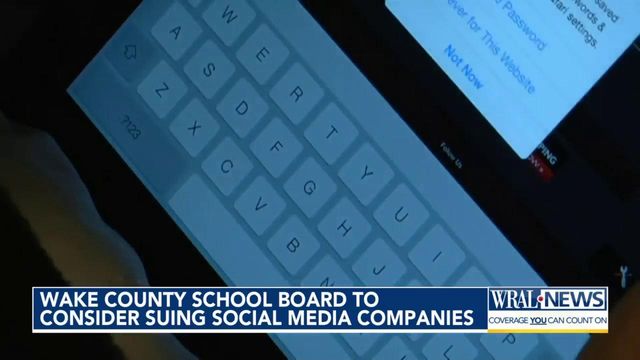Wake schools will join lawsuit against social media companies over student mental health
Wake County’s school board will join a lawsuit against social media companies, arguing that schools have had to handle the fallout of psychological damage caused by their apps.
The school board voted to join in a unanimous vote Tuesday night.
Wake will join a long list of school boards already suing Meta, Google, ByteDance and Snap. Eleven other North Carolina school systems — Charlotte-Mecklenburg, Clinton City, and those in Cumberland, Johnston, Wilson, Union, Robeson, Moore, Wayne, Pitt and Rockingham counties — are already suing the companies, joining hundreds more around the country.
And as of December, at least 42 attorneys general, including North Carolina Attorney General Josh Stein, had also sued.
In a news release issued Tuesday night, the school board argued the companies design their apps to be addictive to maximize advertising revenue.
"The algorithms driving these platforms are designed to exploit human psychology in a way comparable to gambling or drug use to manipulate users into staying on the platform as long as possible," the news release states. "Young people are particularly susceptible to this intense addictive quality, and the content they are consuming is often harmful, such as romanticizing eating disorders or encouraging dangerous trends, violence against others, self-harm, or suicide."
Lawsuits against the social media companies have alleged the companies have failed to warn teenage users of their potential harm and have caused psychological damage to users in the form of increased eating disorders, depression and anxiety. School boards have argued they have been forced to divert educational spending toward efforts to improve children’s mental health.
The lawsuits filed by each school board are nearly identical, claiming that counselors are overwhelmed by higher demand for help, students are distracted during the school day, students are posting about one another during the school day, and teachers are spending more time disciplining students for actions related to social media.
The lawsuits seek to compensate the school systems for the money they've already spent on social media-related issues and to fund future efforts to deal with them.
Board Chairman Chris Heagarty called the lawsuit "common sense" and noted the apps are also often used for bullying, which is an issue board members are always getting calls and emails about.
After the meeting, he said students that during the school day, students have found ways to get around bans on social media in the school system's network.
"So there's very little that we can do to the students, to help the students that are sitting in our classroom that can be victimized, bullied, just bombarded by hurtful, harmful messages," Heagarty said.
Banning cellphones in classrooms isn't a politically popular choice, either, because many parents insist that their children have constant access to a way of communicating with them.
"If we enact a policy that our parents are not going to support or not going to enforce, we'll spend all of our time trying to enforce the policy and we won't have time to focus on the education of the children," Heagarty said. "We really need buy-in. And I hope that people will see the harms that are there, will get behind this... But right now we're not there."
Board Member WIng Ng said the lawsuit is about establishing a standard for social media.
"It’s like having a car. A car is a tool, the Internet is a tool," he said. "Certainly you can speed 150 180 miles per hour but is that really wise? So speed limits are in place to promote safety, and I feel like what we’re doing right now is in some ways trying to provide some strict mechanism of protecting our children."
The other lawsuits have been combined into one national case before a federal court in Northern California. The Wake County school board will be joining those cases.
"We think the mass of school boards across the united states will make a difference," said Janet Ward Black, an attorney for one of the firms that will work with the Wake school board.
The board will retain Ward Black Law and Baird Mandalas Brockstedt and Federico for the lawsuit. The board won't pay any money toward the suit but attorneys would earn fees from any settlement or judgment
The companies didn’t immediately respond to a request for comment. The companies have previously said in statements to news media that they have worked toward improving safety for teens.
Wake’s process in the social media case would be similar to what the school board did when it sued JUUL Labs and other electronic cigarette companies, alleging the companies were marketing to teenagers. Those lawsuits were also combined with other similar lawsuits nationally and have been settled, with Wake schools receiving several million dollars to go toward curbing teen vaping.
On Tuesday, the school board heard from Ward Black, of Ward Black Law, and Matthew Legg, of Baird Mandalas Brockstedt and Federico. Those are two of the law firms representing other schools districts in North Carolina and beyond.
In a slideshow of the presentation they’re scheduled to give, the attorneys argue the social media companies have designed their products to be addicting and that they’ve caused users distress. That distress trickles down into school, where students struggle and educators try to help them with additional resources.












